Garland Sunday
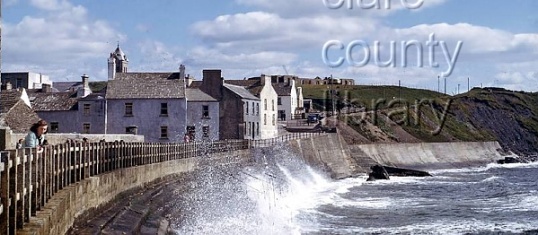
The Promenade, Lahinch
The last Sunday in July is known as Garland Sunday in North West Clare. It was the high point of the summer when I was growing up, a big blow-out before the calendar turned to August. Garland Sunday was the busiest day of the year in Lahinch. My grandmother Susan O’Sullivan had a shop and tea rooms in the seaside village, beside Flanagan’s Bar, which had been her brother’s. From as young as I can remember, I spent my summers in Lahinch with her. I helped in the kitchen, then graduated to cutting ice cream in the shop and eventually weighing sweets and slicing ham.
For Garland Sunday, relatives and friends arrived to give a hand. My paternal grandmother always came in flurry with a huge basin of potato salad made from new spuds and homemade mayonnaise. My mother came with a porter cake, Kitty Flanagan with apple tarts. A lady from Limerick landed annually for the weekend and work as a waitress in the dining room.
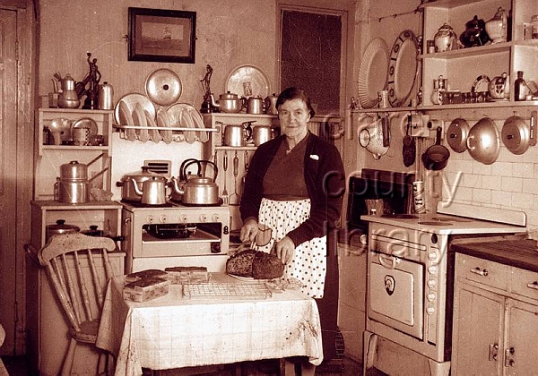
Susan O'Sullivan in her kitchen
From early on Sunday morning, traders and gamers set up stalls on the Main Street in Lahinch. Rifle ranges, roulette tables, chip vans, sea grass and periwinkle tables and gamer had their annual places. A man named Whacker Daly came with a wheel of fortune and hailed, “While she’s racin’, while she’s rollin,’ from the American Bazar you can pick or choose any prize you like.” Whacker’s American Bazar displayed holy statues, sacred pictures, baking bowls, porcelain roosters, jugs, set of mugs and much more. A dapper little man with a small blonde monkey on his shoulder sold tickets curled inside segments of drinking straws and it seemed the same woman always won the jackpot. He had a jingle about her and called her hairy Mary from Tipperary. Dark swarthy men who looked like pirates had small card tables here and there. They were known as ‘trick ada loops’ and children stayed away from them.
By the time last Mass was over, the buzz was on in Lahinch, kids were on the beach, strollers on the prom and the curious and the revelers were on the street. There was noise of action— clack-clack of rifles, whirr of roulette wheels, the clatter from the wheel of fortune and the chatter from Whacker, the screeching monkey and the calls of sea grass sellers. Jigs and reels from buskers and the unending ballad of Patrick Sheehan from a strolling singer who had only one song. People came from everywhere, down from the mountain, up from Miltown and beyond. Men wore suits and ties sent home from America and women donned dresses with style. The village filled and filled as more and more people arrived. As a little kid I remember the wave of visitors that rolled down Station Road every time the a train docked on West Clare Railway.
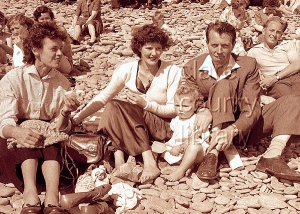
Lahinch beach
It was a high voltage day in my grandmothers with all hands on deck, everyone catering to the needs and whims of the crowd. People wished each other ‘Happy Garland’ and shook hands. Pubs filled with revelers and cadgers. Young women walked in droves up and down the promenade, young men did the same and sometimes the droves collided with great mirth. My grandmother used say it was an old custom and I’d do it too when I was older. She never said what the custom was and years later I learned it was a mating ritual.
By late afternoon Lahinch hummed and it seemed the place was taken over by some spirit. Everyone was in great form, there was celebration, fun, games and the occasional row. At some stage the gathering became a living organism, a unity, that brings to mind the Irish word aonach, which means a fair, a coming together as one. It was like we were transported into another state, there was excitement like you feel at a great match or concert. The noise level and the energy reached a crescendo around 5pm and then dipped. People made their way home and only the stragglers and a few musicians remained in the pubs. The street merchants and gamers packed up and headed to their next stop on the circuit: The Galway Races.
My grandmother closed down the shop and tea room, fed all her staff and recounted adventures of the day. She had a West Clare sense of humor, dancing eyes and an infectious laugh. Then she left us in the kitchen, went to the sitting-room, took up her fiddle and played tunes. She always began with a reel called My Love is in America, a throwback from the time she spent there in the early 1920’s.
Later other musicians arrived — fiddlers Christy Hession, Paddy Killoughery and Preacher Kelly, tin whistle players Dinny Torov McMahon and maybe Gussie Russell. A concertina player from down the West called Looney and other musicians whose faces I have no names for now. The Garland session was legendary and lasted longer than the regular Sunday night gatherings that grandmother hosted.
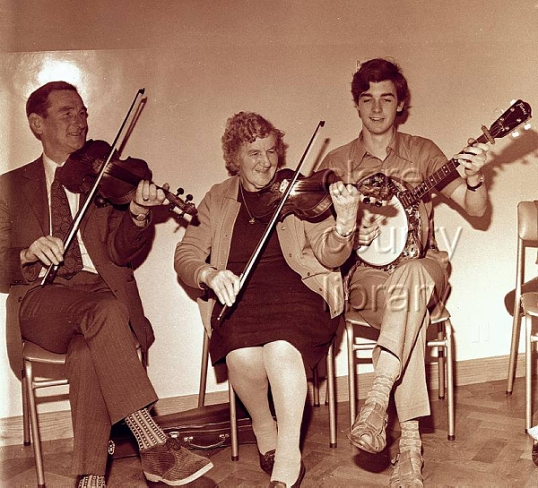
Susan O'Sullivan at the age of 82 with Tom Barrett, fiddle + Kevin Houlihan, banjo
In the mid 1960’s it was thought that the Garland gamers, wheel of fortune and other traveling traders were impeding motor traffic through Lahinch, so the town fathers decided to move them from the street to a car park. It was around the same time that a big sign appeared on the promanade banning anyone in swimming attire from leaving the beach without a robe… Lahinch was getting a bit regimental. Over a few years the traders and gamers stopped coming for Garland Sunday and it merged with all the other Sundays and eventually just melted away.
It was years later that I learned Garland Sunday was the remnants of the old Irish pagan festival of Lughnasa, which marks the beginning of the harvest. I was surprised that we had been celebrating this old custom for over two thousand years. With Máire MacNéil’s fascinating book The Festival of Lughnasa, I put the bits and pieces together: the Saturday cattle fair in Ennistymon which was called Aonach Croim Dubh and ended at noon; the Saturday night vigil at the Blessed Well near the Cliffs of Moher where women prayed and old men sang in Irish. It was a relief to know we were bone-fide pagans long before the New Age dawned.
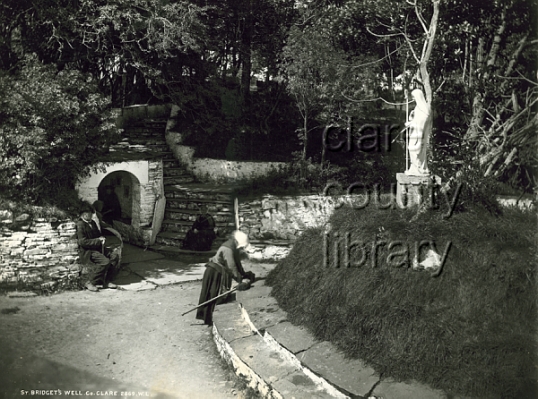
The Blessed Well, near Moher, Co. Clare (aka St. Bridget's Well)
By the time I was old enough to go to the Blessed Well, the custom was almost dead, but I continued visiting the sacred place while I was in Ireland. One year I was the only one there on the Saturday evening and it felt sad that this ancient custom was hanging by a thread. I looked across Liscannor Bay and thought of the tens and tens of thousands who had come here over the centuries. A shower came in from the Atlantic and then a double rainbow appeared. I stood in awe, knowing that I was in the right place at the right time. Alone maybe, but following the footsteps of my own people.
Eddie Stack’s books for Kindle + iPhone
photos: Clare County Library






